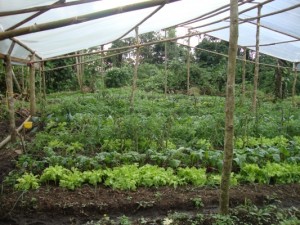 Until recently, the primary product of Pacto Sumaco was a citrus fruit called naranjilla, which resembles a small orange. This fruit, however, is not easy, or even safe, to produce. It is very difficult to cultivate in large quantities because it is a very fragile fruit. It is also highly susceptible to pests and fungi, so it requires large amounts of pesticides. These pesticides are toxic to the growers, who often become addicted to the chemicals. Even more complicating is the fact that the naranjilla has a short life cycle (only 2-3 years) because it quickly destroys the land on which it grows. Thus, the cultivation of an alternative product in Pacto Sumaco was a great need. With funding from Covenant World Relief, IPEE partnered with La Fundación Adelanto Communitario de Ecuador (F.A.C.E.) to offer a solution.
Until recently, the primary product of Pacto Sumaco was a citrus fruit called naranjilla, which resembles a small orange. This fruit, however, is not easy, or even safe, to produce. It is very difficult to cultivate in large quantities because it is a very fragile fruit. It is also highly susceptible to pests and fungi, so it requires large amounts of pesticides. These pesticides are toxic to the growers, who often become addicted to the chemicals. Even more complicating is the fact that the naranjilla has a short life cycle (only 2-3 years) because it quickly destroys the land on which it grows. Thus, the cultivation of an alternative product in Pacto Sumaco was a great need. With funding from Covenant World Relief, IPEE partnered with La Fundación Adelanto Communitario de Ecuador (F.A.C.E.) to offer a solution.
The solution has been the production and cultivation of edible mushrooms, which are far easier and safer to grow than the naranjilla. The mushrooms are safe for the environment and do not require pesticides, which makes them safer for the growers, and safe to eat.
The project, however, is more than just providing a new product to grow. F.A.C.E offers two-day workshops for mushroom growers, which focus on both the theory and practice of growing mushrooms. Business students from North Park University took a trip to Pacto Sumaco, during which they helped growers form business plans and models. Equipment, such as refrigerators, a gas burner and gas tank, pressure cooker and steamer, and magnifying glasses, among other materials, was purchased for the workshop to make the cultivation of these mushrooms even safer.
This holistic approach to community development encompasses some of the core values of CWR: partnership, education, and empowering local people to work with and for themselves to create a safer and better community.


